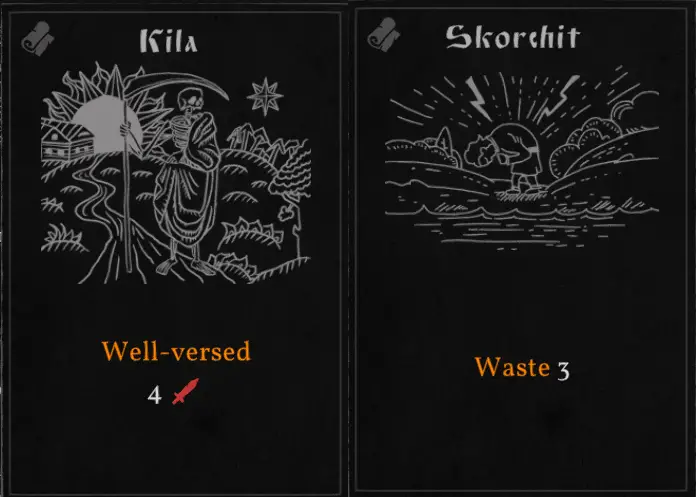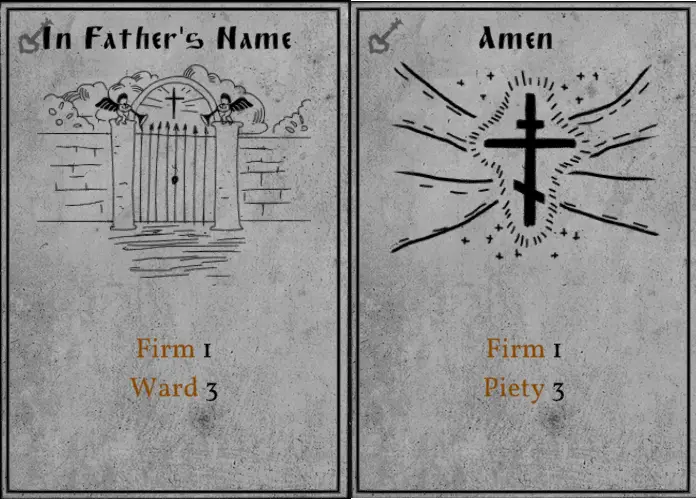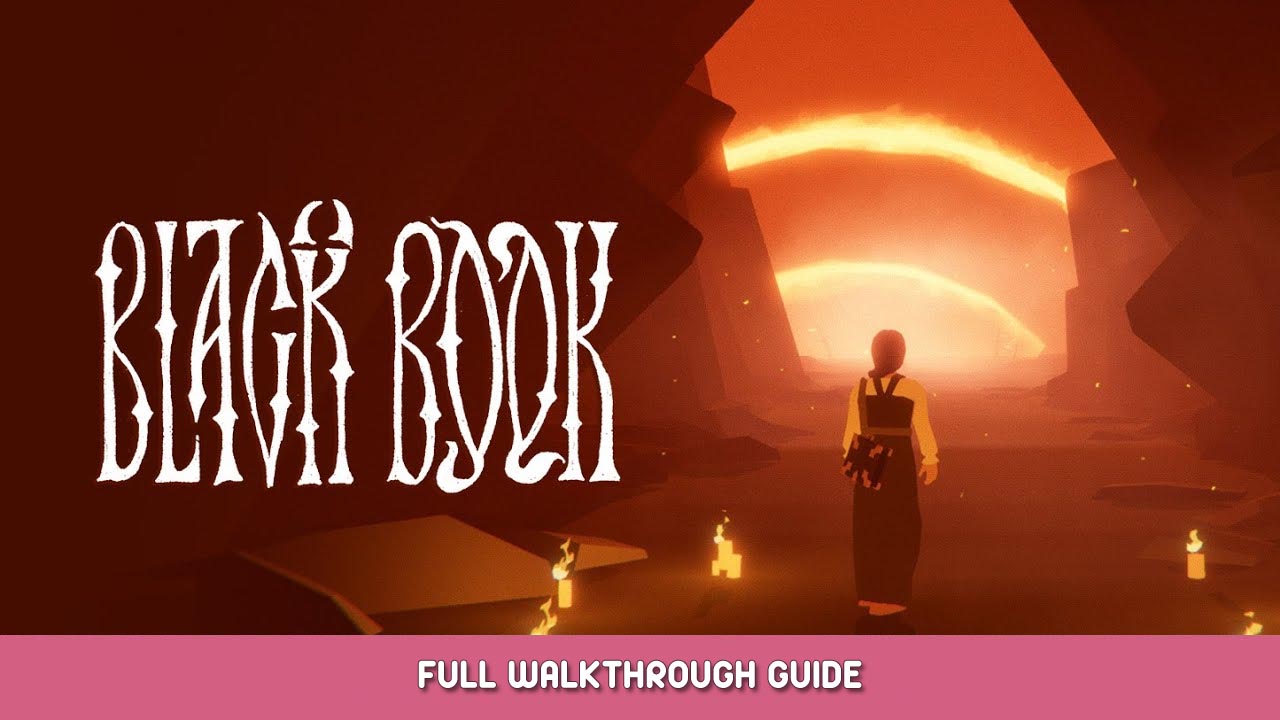Because it’s the most common complaint I’ve heard, this is intended as a basic, general guide on how to build a functional deck for Black Book. This guide is intended for people who have little to no experience with deck-building games, so they can make the best use of the pages they receive.
A Sentence is Made out of Words
You must first understand what the various Words do before you can get an idea of how to make your Book and choose your Pages. The game does explain each Word (and if you have my Glossary handy, I go into more detail with them), but you won’t get very far unless you understand what the different Words mean. How many of us here knew what «cantillation» meant without looking it up in a dictionary? Once you understand how specific Words work, you can begin to see how they affect gameplay – y, En particular, how they might affect other Words.
Ejemplo 1: Kila and Skorchit

Kila will deal 4 damage to a target on its own. lo hace, sin embargo, have the Well-Versed Word, which increases its damage by one for every other Black Page in the same zagovor. It deals 5 damage because it is paired with another Black Page, Skorchit (4 as the base plus 1 from the other Black Page in the zagovor).
Ejemplo 2: In Father’s Name and Amen

This one is a little more difficult. Amen grants Piety, which raises the shield value of a Page by 3 (so if you played Avdelai, you’d gain 8 shields instead of 5). Mientras tanto, In Father’s Name grants you Ward, que te concede 3 shields at the start of your turn. Piety also counts the shields you gain from Ward, so if you had both Pages active (either in the same turn or lingering from a previous zagovor), you’d gain 6 shields at the start of your turn (3 from Ward and a bonus 3 from Piety).
Figure Out What Your Book’s About
The Black Book is only capable of telling one type of story: How I Kicked Your Arse. Sin embargo, depending on the Pages you have available, it can tell that story in a variety of ways. Entonces, once you’ve figured out how the Words work and how to combine them with other Words in your zagovors, you can start thinking about how you want your Book to tell the story of your enemies’ demise.
- Do you want to set fire to your enemies and watch them burn as they try and fail to breach your defenses?
- Do you want to watch a snowball grow in size until it crushes your opponent at the bottom of a hill?
- Do you want to say something so powerful that it rattles around in your opponents’ heads and shreds their brains long after you’ve finished speaking?
Choose a theme and then begin binding your Book to fit. If you try to make your Book do too many things, it will end up being weak or mediocre at all of them, so you will need to specialize a little and possibly edit it on the road (which is where all those spare Pages will come in handy).
Is this a Short Story or a Doorstopper?
Most deck-building games have a minimum and a maximum number of cards you can have in your deck. Black Book is no exception; your Book must have between 13 y 33 páginas, which means you must select your Pages carefully for maximum impact.
A smaller Book allows you to cycle through your Pages more quickly, allowing you to get to what you want the Book to do without having to sift through options that don’t necessarily work with what you want. A larger Book, por otro lado, gives you more options for responding to various threats or circumventing the defenses of other creatures.
There is no «right way» to go about it; you must determine what is best for you. This is something that comes with trial and error, so don’t be afraid to have multiple saves so you can go back and reconfigure your Book if something isn’t working.
En esa nota, you should have a wide range of Pages available to you to build your Book with – there’s nothing worse than getting to an important fight, deciding on a strategy, and then discovering that your strategy is dependent on a Page you don’t have access to!
Proofreading
So you’ve put together a Book. Now you must go through it to ensure that everything works properly and that you will not encounter any issues when attempting to play it. You’re considering questions like:
- Can I defend myself?
- Can I heal myself if I take damage?
- How much damage am I giving out?
- Do I have enough Pages to be able to do what needs doing?
- Is it going to take too long to get the Pages out that I need?
- Is my entire strategy reliant on a single Page? (this is bad)
- If I were trying to defeat someone using this Book configuration, how would I go about it?
Give your book a thorough once-over to see what needs to be changed. You may not be able to do this until you are in the field and working with it (which is when having all those extra Pages to choose from comes in handy).
Supplementary Material
While your main focus in battle is your Book and the Pages within it, you have other tools at your disposal to aid in your efforts. The keyword here is support; it is not always possible to rely on those things or to build large strategies around such limited resources.
Hierbas
Always useful in a pinch to get you out of a jam you didn’t expect. If you find yourself using them all the time, it’s a sign that you don’t have the best Book for your situation. Do some more proofreading, especially given the enemies you’re up against, and perhaps reload to earlier states if something isn’t working out for you.
While there are some later Pages with Words that interact with herbs you use (Burning Herbs, Por ejemplo, inflicts damage on your enemies every time you use a herb), it’s not something you want to base a Book on. It could serve as a backup plan in case of an emergency.
Elementos
These can help you get a head start on some Book layouts (usually those that give you something on the first turn), while others can give you a slight advantage in something (maybe a couple of extra health, or a boost in healing, or a slight reduction in enemy damage). Every little bit counts, and you should mix and match your items to suit the Book you’re working with – what the «mejor» item depends largely on what your Book has.
Talento
These can give you a head start on some Book layouts (usually those that give you something on the first turn), while others can give you a slight advantage in something (maybe a couple of extra health, or a boost in healing, or a slight reduction in enemy damage). Every little bit helps, and you should mix and match your items to fit the Book you’re working with – what the «mejor» item depends a lot on what your Book has.
Co-Writers
You have one more resource to draw on during your journey: the companion you chose to travel with. Depending on how you’ve bound your Book at the time, their abilities will be useful to you. You can use them to augment what your Book does and make it much more vicious, or as an emergency boost to help shore up a gap you’ve discovered. You ideally want your companion to support the way your Book works, so choose them carefully – especially since you won’t be able to swap them out in some sections.
Levonty
- Levonty uses Waste, so he’s useful if you need damage-over-time, especially if you’ve completed his quest and he can add Decompose on top of it. Levonty will come in handy if you have a Book based on Waste.
Nikolay
- Nikolay merely inflicts damage. Simple and effective for a quick (literal) kick when you need it. It’s worth noting that his damage has no effect on anything you have that boosts it (such as Bless).
Old Egor
- Old Egor will Curse your enemies, reducing their damage output – useful for Books where you need to control how much damage your enemies deal out, if you have Pages that deal damage based on the Curse status, or if you’re working with a Book that hurts your enemies when they hurt you.
Proshka
- Proshka will provide you with some additional shields, cual, interestingly, interact with Piety and other shield-related effects. Proshka will be extremely useful if you’ve bound your Book around gaining shields and effects that deal damage when you gain shields.
Three Example Books
Bueno, now that we’ve covered the fundamentals, I’ll put together three Books as examples of reasonable Book builds, all of which use Pages from the First Seal. Remember how I mentioned three different types of books in section 2? I’ll try to construct those as examples.
Quemar (15-19+ paginas)
- Black Orders: Skorchit (4), other damage-dealing Pages to taste
- White Orders: Avoil (2), Salmanida (1-2), Varahail (2)
- Black Keys: Koldun Fiend (1-2)
- White Keys: Amen (1-2), Babushka-Serafimushka (1), In Father’s Name (1-2), Once and Forever (2)
- Engranaje: Items that enhance Waste, Piedad, or Ward; items that grant extra shields
- Talento: Help of Saints, Orders I/II, Keys I/II
- Compañeros: Levonty or Old Egor
This book is for those who want to set their enemies on fire and then sit back and watch as they burn to death and pound ineffectively against your defenses. Skorchit is your primary damage-dealing Page, with Amen and In Father’s Name bolstering what you get from Avoli and Once and Forever. Babushka-Serafimushka speeds up the cycle of your Keys (while also healing any wounds that might slip through with Salmanida), while Koldun Fiend and a little help from Varahail cover any extra direct damage that you might need to top enemies up with.
The items you equip will either help boost your defenses so they can’t hit you, or they will set them on fire faster. santos’ assistance boosts your White Pages, which means you may be able to replace them with other Pages if you’re facing weaker enemies. Old Egor can help weaken your enemies so they don’t hurt you as much if they get through your defenses, while Levonty can help set them on fire faster (and more aggressively if you’re dealing with a boss).
Avalanche (17-20+ paginas)
- Black Orders: Griya (4+)
- White Orders: Avoil (1-2), George the Father (2), Salmanida (1-2), Varahail (4)
- Black Keys: Koldun Fiend (1-2)
- White Keys: Amen (2), Once and Forever (2)
- Engranaje: Items that boost damage or grant extra shields.
- Talento: Fierce Words, Orders I/II, Keys I/II
- Compañeros: Cualquier
This Book is based on Griya, gradually increasing the amount of damage you do with each attack until it can completely crush your enemies. Your White cards are either providing much-needed protection (Amen, Avoil, Once and Forever) or increasing your damage (George the Father), o ambos (Varahail). Any of the companions can help you with this Book, but in different ways: Proshka can provide emergency defenses, Old Egor can help control your enemies’ salida de daños, Levonty can add some burn, and Nikolay can throw some extra punches. The longer you can survive, the more damage you can deal with your cards.
Eco (16-21 paginas)
- Black Orders: Kila (2), Nava (4)
- White Orders: Varahail (2-4), Salmanida (1-2)
- Black Keys: Firmer Than Stone (1-2), Koldun Fiend (1-2), Cerrar (2)
- White Keys: Amen (1), Babushka-Serafimushka (1), Once and Forever (1)
- Engranaje: Items that grant Eloquence (Negro) or interact with Well-Versed or Firm; items that reduce enemy damage, increase your shields, or increase your health
- Talento: Fierce Words, Help of Saints, Keys I/II
- Compañeros: Old Egor or Proshka
This is a damage-heavy Book in which you are utilizing both Firm and Well-Versed – all of your Black Pages have one of those Words on them, with Nava having both, so you get not only immediate damage but also lingering damage for the next zagovor. When combined with the Bless from Varahail, your Pages and zagovors will be wreaking havoc. Vas a, sin embargo, need to manage your defenses carefully with this one, as a large portion of your zagovor will be taken up with Black Pages – items that grant you extra defense support will be extremely useful, as you won’t have much trouble keeping the damage up. Old Egor or Proshka are your primary companion options, as they will be able to significantly reduce enemy damage (Old Egor moreso than Proshka).
Eso es todo lo que estamos compartiendo hoy para este Libro negro guía. Esta guía fue originalmente creada y escrita por Lofwyr. En caso de que no actualicemos esta guía, puede encontrar la última actualización siguiendo este enlace.

